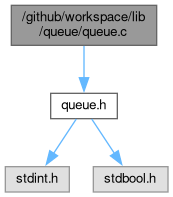Generic FIFO queue implementation for embedded safety-critical use. More...
Include dependency graph for queue.c:

Macros | |
| #define | PRIVATE static |
Functions | |
| PRIVATE void | copy_bytes (uint8_t *dst, const uint8_t *src, uint16_t size) |
| Deterministic byte-wise copy of memory. More... | |
| queue_status_t | queue_init (queue_t *q, void *buffer, uint16_t buffer_element_size, uint16_t queue_capacity) |
| Initialize a queue instance. More... | |
| queue_status_t | queue_push (queue_t *q, const void *item) |
| Push (enqueue) one element into the queue. More... | |
| queue_status_t | queue_pop (queue_t *q, void *item) |
| Pop (dequeue) one element from the queue. More... | |
| bool | queue_is_empty (const queue_t *q) |
| Check if queue is empty. More... | |
| bool | queue_is_full (const queue_t *q) |
| Check if queue is full. More... | |
Detailed Description
Generic FIFO queue implementation for embedded safety-critical use.
- Version
- 1.0.3
- Date
- 2025-11-06
Provides deterministic enqueue/dequeue operations on a caller-supplied memory buffer. Implementation uses explicit byte-wise copying and avoids standard library dependencies to ensure predictable timing.
MISRA Deviation: DV-QUEUE-001 (Rule 11.4) Controlled cast from void* to uint8_t* for raw byte access. Safe because data is not type-reinterpreted.
Macro Definition Documentation
◆ PRIVATE
| #define PRIVATE static |